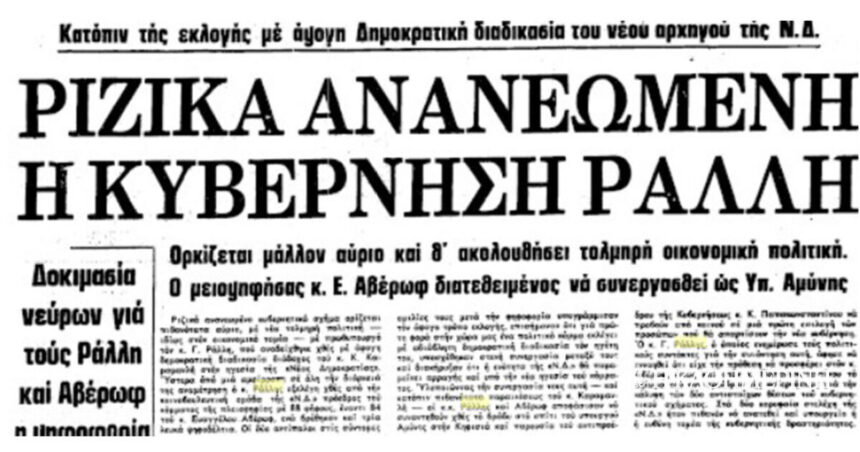OR New Democracy It prevailed with relative ease in the 1977 elections taking 41.84% of the votes and electing 171 Members. However, her omnipotence on the political scene was shaken by the rise of Panhellenic Socialist Movement (PASOK) by Andrea Papandreou, who expressed the request of a large part of the electorate for change. Product of time, the tiredness of the ruling faction has become apparent. The chances of a third consecutive electoral success seemed slim.
Attempting to somehow mitigate the radical change in the political scene, which Papandreou was adopted Konstantinos Karamanlis made the decision to claim the Presidency of the Republic In the spring of 1980, after fourteen years in prime minister (1955-1963 and 1974-1980). Its purpose was to guarantee the political normalcy it had, inter alia, with Greece’s accession to the EEC in 1979, but without provoking a conflict between state and political leadership, as it had happened during the period of national division between Eleftherios Venizelos and Constantine I.
The post of party president was claimed by Karamanlis’ close associates, Evangelos Averof-Tositsa and George Rallis.
The Macedonian politician received the approval of the majority of the House of Representatives by the Constitution of 1975 during the third vote on May 5. The next day he submitted the resignation of his government to the President of the Republic, Konstantinos Tsatsos. Immediately the necessary processes were made for his succession to the party and, by extension, to the country’s political leadership. The election by the New Democracy parliamentary group for the post of the party’s president was claimed by close associates of Karamanlis, Evangelos Averof-Tositsa and George Rallis.
In the past, it has been argued that the two men were expressing two different trends within the party, Rallis, a more liberal – center -right, while Averoff is a more conservative. To a large extent, however, this view has been rejected as both men came from the same school of thought, that of the liberal center -right, which attacked the European future of Greece. Their differences concerned the tactics that the party had to follow against the rising PASOK and the Left.
Averoff expressed the tendency of a more militant political confrontation with PASOK, while Rallis was in favor of the dominance of a mild political climate.
Averoff appears to have wished not to alienate the party from its conservative audience, considering that it was not necessary to enlarge the center in 1978. He expressed the trend of a more militant political confrontation with PASOK. On the contrary, Rallis was advocate of mild political climate prevalence. As a result, Averoff sought the support of the most conservative members of the parliamentary group in his attempt to be elected President of the New Democracy.
The vote for the election of the new president of the ruling party took place on May 8, in the House of Commons. According to the provisions of the party’s statutes, the new chairman would be elected by the parliamentary group by an absolute majority of the total number of 175 MPs (after the 1977 elections, four more MPs had joined the ND, including Konstantinos Mitsotakis). The New Democracy Parliamentary Group elected president and by extension prime minister with 88 votes to George Ralli. Averoff received 84 votes, while three MPs filed a white vote.
The result was a surprise, as it was more likely to be the election of Metsovite Averoff. He immediately recognized the result by congratulating Ralli on his election.
Column: Myrto Katsigera, Vassilis Minakakis, Antigoni-Despina Poumenidou, Athanasios Syroplakis




